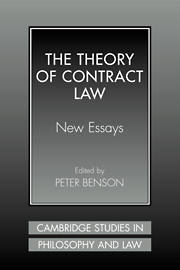Book contents
- Frontmatter
- Contents
- Acknowledgments
- Contributors
- Introduction
- 1 Two Economic Theories of Enforcing Promises
- 2 The Scope and Limits of Legal Paternalism: Altruism and Coercion in Family Financial Arrangements
- 3 Promises and Contracts
- 4 The Unity of Contract Law
- 5 The Theory of Contracts
- 6 Contract Law in the Aristotelian Tradition
- Index
2 - The Scope and Limits of Legal Paternalism: Altruism and Coercion in Family Financial Arrangements
Published online by Cambridge University Press: 05 October 2009
- Frontmatter
- Contents
- Acknowledgments
- Contributors
- Introduction
- 1 Two Economic Theories of Enforcing Promises
- 2 The Scope and Limits of Legal Paternalism: Altruism and Coercion in Family Financial Arrangements
- 3 Promises and Contracts
- 4 The Unity of Contract Law
- 5 The Theory of Contracts
- 6 Contract Law in the Aristotelian Tradition
- Index
Summary
Introduction
A. The Analytical Problem
The regulation of family business financial arrangements has become a major problem for contract lawyers in Commonwealth jurisdictions. While the communality of family life and the informality and trust that it engenders are often rightly celebrated, they can also permit dominant family members to impose financial risks on other members that they would not otherwise choose. A recurrent example involves family homes being used as security for business ventures being undertaken by family members. Wives are sometimes induced by their husbands, who operate small businesses that are in financial difficulties, to enter into a mortgage of the jointly owned family home to secure the business's line of credit. The business subsequently fails and the bank moves to foreclose on the mortgage. Similarly, parents are sometimes induced by adult children to enter into security transactions to obtain credit for the child's business. Not understanding the legal implications of the transaction or appreciating the risks of the venture, wives and elderly parents can be led to stake their interest in their home in what they ought to view as a poor investment. When these risks materialize, courts are asked to allocate the loss from the venture as between the unsophisticated family members and the lender holding the security. The principles upon which courts make these allocations determine the terms upon which lenders will advance credit to many small businesses.
- Type
- Chapter
- Information
- The Theory of Contract LawNew Essays, pp. 45 - 85Publisher: Cambridge University PressPrint publication year: 2001
- 5
- Cited by

